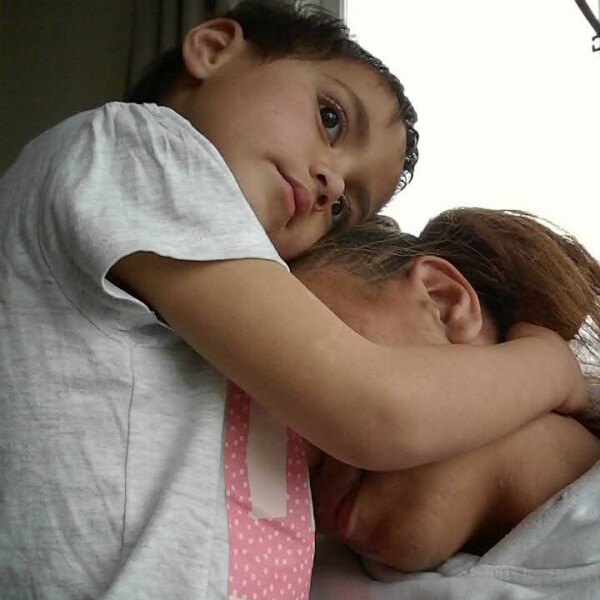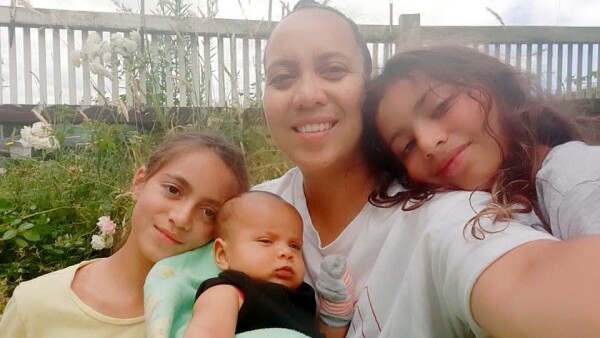Tupou was planning to drop her young daughters off with her sister-in-law and leave them.
Not to do anything extreme.
And not forever.
But she was desperate.
Tupou did not know exactly what or how, but she knew she felt done. And something had to change.
Tupou’s first daughter was born suddenly at 32 weeks. That same day, her husband Jay started his career in the New Zealand Army – he was only able to stay for the birth and left a few hours after. While Jay was away at his Basic Training, Tupou faced the challenges of new motherhood away from him and her family, who lived in a different city.
Their second daughter was born a little over a year later and she also arrived early, at just 34 weeks.
Then, Tupou and Jay’s third child was unable to reach full-term due to medical reasons – the difficult decision to end the pregnancy went against everything Tupou believed in.
The loss brought “a heartbreaking moment” and marked the beginning of Tupou’s painful downward spiral.
“Depression was a slow process and at the time, I didn’t understand it,” says Tupou.
At this point, the young family had already moved multiple times due to Jay’s military postings. Jay was often away from home for extended periods, leaving Tupou to parent alone.

Tiare & Monria were born almost exactly one year apart
“With my first daughter, I was so vigorous in her care. And after our second daughter, I was so into making sure they were okay. I’d get up every morning and focus on caring for them. But after we lost our third baby, I just lost that motivation. I was trying my best, but I just don’t know where it went.”
Across Aotearoa, too many parents of new pēpi (babies) like Tupou are feeling completely hopeless but silently struggling with their mental health challenges. Stigma, cultural barriers, and fear stop them from asking for help – and without the right support, they slip further into crisis.

“I was so scared of admitting to anyone what I was going through,” says Tupou. “Because I was so afraid of the stigma about the social worker being called in and me being deemed an unfit mother. And I really didn’t want my children to be taken away from me.”
Plunket teams are often the only ones who see behind closed doors. They play a crucial role in supporting new parents, often being the first to notice when something isn’t right.
Sure enough, after weeks of visits, Tupou’s Plunket nurse saw the truth: something was wrong. She was able to offer help to this scared māmā just in time – before Tupou left her girls. When she visited on that particularly dark day, she asked one simple but powerful question.
“Do you need help?” asked the nurse.
“After that, I could breathe again,” says Tupou, reflecting on that difficult day. “That’s the only way I can describe that experience. It’s like, finally, someone gave me the permission to breathe.”
Looking back, Tupou is grateful for the honesty and reassurance from her Plunket nurse, whose intuition allowed her to point out what was obvious to her, even if it took Tupou a little longer to realise.
She provided a safe place for Tupou to open up – and created a critical turning point.
“She [the nurse] just took my hand and said, ‘Your kids are safe. You’re just going through a hard time’.”
Plunket nurses, community Karitāne health workers, kaiawhina or volunteers have more time to spend with whānau. They listen and work with them to build trust and figure out a plan for what they need, which may include additional care and support.
With encouragement from her Plunket nurse, Tupou went on to seek counselling, and received support from Plunket through other services like a kaiawhina who further connected with Tupou emotionally and culturally, as well.
Since then, Tupou has felt strong enough to go on to have another baby that she so deeply wanted to complete her beautiful family - Joshua will be three soon.

Tupou with little Joshie, Tiare (left) and Monria in the background, enjoying their favourite beach.
This level of care and support for struggling parents like Tupou, through the building of relationships rather than one-off visits, is what Plunket aims to provide.
Our incredible supporters make it possible for Plunket staff and volunteers to be there for as many families as possible across Aotearoa.
“Your koha is creating a whole web of support,” says Tupou. “You’re helping a mother who feels so empty and alone."
"Your gift says to someone like me, who is feeling so guilty thinking she’s being the most horrible mum ever, ‘hey it’s ok, I’ve got you … until you’ve got yourself,’” says Tupou.
Help Plunket continue to provide that level of care and connection this Christmas – because every whānau in Aotearoa deserves to feel even better than ‘ok’.
